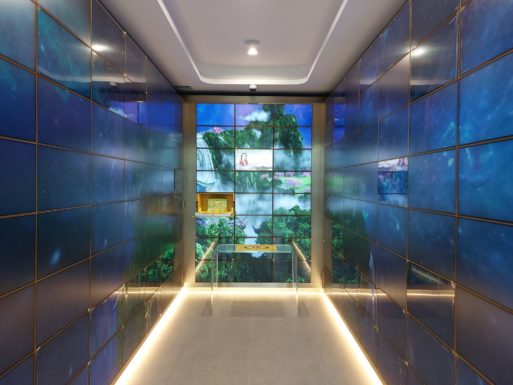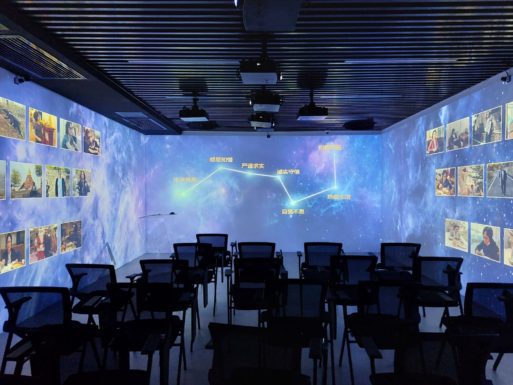
A digital cemetery run by Beijing Jiuli Digital Technology Co.
Credit: Lucille Liu / Bloomberg
As society grows more digitally oriented and the need to confront global challenges like urban land scarcity becomes more urgent, cemeteries in China are exploring the potential of full-scale digital cemeteries. These spaces include fully digital burial plots (featuring electronic screens instead of headstones), as well as metaverse mausoleums, virtual memorial services and more.
The concept of an entirely digital cemetery is part of a larger trend, and perhaps the final culmination around the technological transformation of end-of-life services. In recent years, we have witnessed advancements like livestreaming funerals, online memorials, AI grief tools, cremation startups and even multimedia tombstones. Bringing all of these developments and more together to a single space constitutes a digital cemetery.
A recent article by Bloomberg shed light on the development of cyber cemeteries in China in particular, where the government is actively pushing for this shift, due to a lack of land supply in cities like Beijing, Shanghai and Hong Kong. In the digital cemetery model, the deceased are still cremated (the preferred method of disposition in China), but instead of the remains being buried, they are kept in columbaria which are outfitted with fully integrated technologies that cover everything from personal metadata to record-keeping, navigation, memorial content, media and more. According to the article, “a digital cemetery spanning 20 square meters (215 square feet) can accommodate more than 150 plots, while a site that size would hold only six traditional gravesites.” It is also more cost-effective than a traditional burial.
While the article focuses on the financial, sustainability and space-saving benefits of cyber cemeteries, the implications around remembrance are perhaps even more fascinating. We are conditioned to think of tangible burial plots as more “permanent” and “real,” but are they, actually? Materials degrade over time, weather and other factors disrupt the environment, and historically, contentions over borders and land ownership have meant that no physical space is guaranteed forever. (Not to sound too dystopian), but as land scarcity becomes a bigger problem, who can say how far corporations and colonizers will go to grab more of it, even in the near future?
In terms of long-term preservation, digitization is the way to go. It will soon be the primary way that society preserves material culture for future generations. Think about what historians could do if they had access to digital cemeteries for the vast majority of human civilizations. Consider also how much richer our lives would be if we as descendants had 100% access to our ancestors’ digital ephemera and records, and audio, video and photography of them.

A demonstration of a memorial service at a digital cemetery in Beijing.
Credit: Lucille Liu / Bloomberg
For these reasons, the project “Heaven on the Cloud” is interesting, both in practice and as a topic for speculative thought. Launched by Chinese funeral technology services provider Fu Shou Yuan, “Heaven on the Cloud” is an interactive online mausoleum created using digital twin technology:
“The project enables clients to create virtual islands with a person’s images, digital assets, sound files and more. Users can customize elements such as weather conditions and plants, and can even own virtual pets on the island. Through the replication of the deceased’s voice, likeness and more, loved ones can interact with the digital form of the deceased, share their life stories and pass on family narratives for generations.”
In an age where we are far more represented online than our ancestors ever were, this solution feels more in line with how we live as a society. Most people today leave a sizable digital trace on social media, which can be mined to paint a rich, authentic picture of who a person was after they have died.
Ultimately, how one is interred is a personal choice. There will always be people who prefer traditional burial. Digital cemeteries offer an alternative model, one that addresses challenges around sustainability, allows us to remember loved ones in a more interactive way, and potentially offers greater security around preserving our histories.

 China Pilots New Models for Digital Cemeteries
China Pilots New Models for Digital Cemeteries



 Our Monthly Tip: Toast a Loved One with a Personalized Glass
Our Monthly Tip: Toast a Loved One with a Personalized Glass
 My Cousin’s Death Taught Me the Meaning of Life
My Cousin’s Death Taught Me the Meaning of Life














